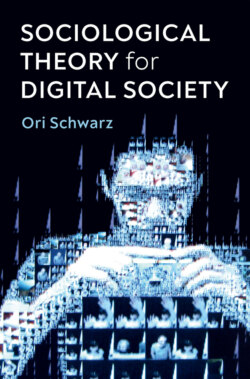Sociological Theory for Digital Society

Реклама. ООО «ЛитРес», ИНН: 7719571260.
Оглавление
Ori Schwarz. Sociological Theory for Digital Society
Contents
Guide
Pages
Sociological Theory for Digital Society. The Codes that Bind Us Together
Copyright page
Acknowledgements
1 Introduction: Old disciplines, new times, revised theories
Notes
2 When Interactions Become Objects: Rethinking symbolic interactionism in the post-situational order
Generalizing co-presence
A post-situational world?
When interactions become objects
From interaction to exhibition: the interaction-object duality
The pandemic and the future
The effects of the interaction-object duality
Digital mirroring
A future for interactionism?
Protentions
Post-situational interactionism
Owning situations
Chase interactionism
Notes
3 When Networks Materialize: Rethinking social ontology beyond the individual and the collective
The network as a metaphor
Becoming a network society
Performativity
From metaphors to data objects
Connectivity
Connective action
Connective memory
Central conflation
Two technologies of the social
Notes
4 When Social Capital can be Invested: Rethinking social capital
Ties as capital
When social capital goes online
Generalized social capital as meta-capital
Social capital banks and mediators
Conclusion: the qualitative transformation of social capital
Notes
5 When Power is Exercised through Algorithms: Rethinking power under generative rulers
The power of algorithms
Increased governability: when you cannot say Winnie the Pooh
Abstract rules and concrete reality
Power, consciousness and legitimation
Resistance through detours
Beyond bureaucracy: between power and categorization
Secret rules
Power as potential or actual
Conclusion
Notes
6 When Labour is Everywhere: Rethinking work in the era of workless labour
Digitalization and waged labour
The Glass diagram
Pollination and the productivization of everyday life
Is that still labour?
Defining workless labour
Notes
7 Conclusion: Sociological theory for the future
References
Index
POLITY END USER LICENSE AGREEMENT
Отрывок из книги
Ori Schwarz
The core questions of sociological theory are so abstract and fundamental they seem timeless and beyond time: questions of ontology; the choice of units of analysis; temporality; social action and its motives; power, causality and social change; structure and agency; knowledge and epistemology. It has never been possible and never will be to study social life, explain it, or even humbly describe it without first answering these timeless questions, explicitly or implicitly. This simply cannot be done without choosing units of analysis and making certain assumptions about their relations, the ways they can be studied, and how they may interact and change. Every sociology student is familiar with these eternal oppositions that every theory must address and overcome in its own way: micro and macro, agency and structure, consensus and conflict, materialism and idealism, positivism and constructionism. Every theory offers general assumptions about what motivates and shapes social action and what binds human actions together into something bigger. The answers to these questions often claim to be transhistorical and universally valid.
.....
And yet, this book does not aim to develop ‘a theory of the digital society’, or a theory of the ‘social implications of the internet’ and mediatization,2 as I do not consider digitalization, algorithms or the internet to be simply new objects for sociological research, or new spheres of social life in need of theorization. Instead, I suggest that digitalization processes remould the social in complex and non-deterministic ways across social spheres, and hence require a much more ambitious endeavour – revising general sociological theory (or rather, theories). In this sense, this book goes against the endeavour to construct ‘digital sociology’ as yet another subdiscipline not unlike the sociology of education or the sociology of finance, organized around its own object of study, the digital as a sphere, segment or dimension of social life (Daniels et al. 2017; Lupton 2015; Orton-Johnson and Prior 2013; Selwyn 2019), and around its unique digital methods (Marres 2017). Indeed, revising sociological theories and concepts to adapt them to contemporary digital societies sometimes improves their capacity to theorize other aspects of social life which have little to do with digital technologies.
Chapter 2 explores the challenges digitalization poses to the symbolic interactionist tradition. Digitally mediated interactions constitute a growing share of all interactions; and they are self-documenting, hence they turn into the shared production of evidential data objects. This transformation challenges some of the most fundamental premises of symbolic interactionism: that the basic building blocks of social life are situated interactions, which are well-bounded in time and space; that these ‘social situations’ consist of a finite known number of participants who mutually monitor one another within situations and move from one situation to another; that situations and roles within them are defined through situated negotiation; and that the self develops and emerges through interaction with human alters. Some of the challenges involved in adapting interactionism to a world in which interactions are increasingly mediated can be easily met if we only reformulate core interactionist concepts such as ‘co-presence’ and ‘the looking-glass self’ by generalizing and thus expanding them. Other challenges are more fundamental: when digitalization translates interactions into durable digital data objects (which may become available to unknown and theoretically unlimited audiences), it blurs the very analytical distinction between interactions and objects. To address this challenge, I develop the concept of interaction-object duality, explore some of its empirical and theoretical consequences (e.g. for the presentation of self; for the ‘bracketing’ of interaction as a theoretical and epistemological strategy; and for the temporality of social life), and draw outlines for a post-situational interactionism, that is, symbolic interactionism for the post-situational order of the digital era.
.....